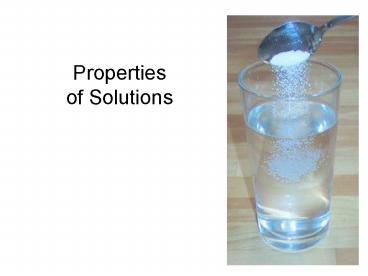Properties of Solutions - PowerPoint PPT Presentation
1 / 29
Title:
Properties of Solutions
Description:
Properties of Solutions – PowerPoint PPT presentation
Number of Views:45
Avg rating:3.0/5.0
Title: Properties of Solutions
1
Properties of Solutions
2
A Solution is
- A homogeneous mixture
- The substances in the mixture are in the same
physical state
(solid, liquid, or gas)
3
Gas solution
- Air is a homogeneous solution of different gases
- Nitrogen, oxygen, water vapor, carbon
dioxide.etc.
4
Solid Solution
- Metals are often mixed together to form a solid
solution called an ALLOY - Brass is a solid solution of zinc and copper
5
Liquid Solution
- Most of the solutions in Chemistry are in the
liquid phase - Most common solution is a solid substance
dissolved in a liquid
6
Liquid Solution solvent solute
- Solute is the solid (present in small amounts)
- Solvent is the liquid (present in large amounts)
- When the 2 are mixed, the final result is a
solution
7
Liquid Solution solvent solute
8
Solvents
- The most common solvent is water. It is often
called the Universal Solvent. Many (but not
all!) substances will dissolve in water - Can you think of a substance that does NOT
dissolve in water?
9
Aqueous Solutions
- A solution made with water as the solvent is
called an aqueous solution (aq) - NaCl (s) Na (aq) Cl- (aq)
A salt water solution
10
Solvents
- There are solvents other than water. These are
often used to dissolve substances that do not
dissolve in water. - Can you think of a type of solvent besides water?
11
What do liquid solutions look like?
- homogeneous mixtures
- Clear, not cloudy
- May have color
- The solute does not settle to the bottom
- Pass through filters
12
Are these solutions?
13
Are these solutions?
14
Solubility
- Substances that dissolve easily are called
SOLUBLE - Salt is soluble in water
15
Solubility
- Substances that do not dissolve easily are called
insoluble - Nickel is insoluble in water
16
Factors that influence solubility
- Why are some substances soluble in water, but not
in other liquids? - Why are some substances not soluble in water?
- What can be done to make a substance dissolve
more easily? - It helps to understand what controls solubility.
17
Factors that influence solubility
- 1 TEMPERATURE
- As temperature increases, most solids become more
soluble in water. - Ex. Sugar in ice tea vs. hot tea
18
Factors that influence solubility
- 1 TEMPERATURE
- As temperature increases, most gases become less
soluble in water. - Ex. The carbon dioxide (fizz) in cold soda vs.
hot soda
19
Factors that influence solubility
- 2 Pressure
- As pressure increases, most gases become more
soluble in water. - Ex. The carbon dioxide (fizz) in soda in a
pressurized can vs. soda that has been left open
(goes flat at low pressure)
20
Factors that influence solubility
- 2 Pressure
- PRESSURE HAS NO EFFECT ON LIQUID OR SOLID
SOLUTES!!!
21
Factors that influence solubility
- 3 The Nature of the solute and solvent
- where like refers to the polarity of the
molecule
Like dissolves Like
22
Factors that influence solubility
- 3 The Nature of the solute and solvent
- POLAR solvents dissolve POLAR solutes
- (Polar includes ionic compounds)
Like dissolves Like
23
Factors that influence solubility
- 3 The Nature of the solute and solvent
- POLAR solvents dissolve POLAR
solutes - So ionic NaCl will dissolve in polar water
Like dissolves Like
24
What is going on at the molecular level when a
polar substance dissolves?
Na
Cl-
The polar water molecule pulls apart the
ionic compound into anions and cations If you
evaporate away the water, the Na and Cl will join
together again to make NaCl (s)
25
Na
Cl-
For this to happen, the attraction between the
positive end of the water molecule and the
negative ion must be STRONGER than the attraction
between the positive and negative ion.
26
(No Transcript)
27
Factors that influence solubility
- 3 The Nature of the solute and solvent
- NON POLAR solvents dissolve
- NON POLAR solutes
- Non polar solvents and solutes simply mix together
Like dissolves Like
28
Factors that influence solubility
- 3 The Nature of the solute and solvent
- fats and oil are non polar
- Oil (non polar) will not dissolve
- in water (polar)
Like dissolves Like
29
Soaps
- Soaps are long molecules that have a polar end
and a non polar end - Grease (non polar) does not dissolve in water
alone (polar), but if soap is added, the grease
will dissolve in the non polar end of the soap.
The polar end of the soap allows it to dissolve
in the water, washing away the grease































